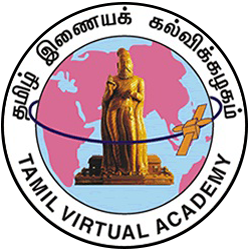Primary tabs
D04135 - LESSON - 5
Tamil of the Sangam era
Tamil of the sangam period did not differ from that of the period of Tholkappiar. Letters occuring in the beginning and at the end of the Tamil words including variations in pronunciation form the content of this lesson. Place names also showed some changes over the years. Verbs have added some new endings. New formulas for non-finite verbs and unfinished action-nouns are presented in this lesson.
Introduction to Sangam literature, phonemics, morphology of nouns and morphology of verbs form the four central units.
Sangam literature comprises eighteen works indicated by Ettuthokai and Pathupaattu.
As for the phonology of Tamil of this period there has not been any major change in the language from what is described by Tholkappiar. Such minor deviations are illustrated in the first unit.
Some changes occurred in the three pronouns, the expression of plural in lower status, the form of singular nouns as Yam and Neer and double plurals in higher status are illustrated in this unit.
Unlike in the period of Tholkappiar, sangam literature used Viyankol Vinaimuttu not only in the third person but also in the first and second persons. Among the ten non-finite verbal endings, Cheythu and Cheya occur more frequently in Sangam literature. In addition to the two Peyarecham like Cheytha and Cheyyum, sangam literature introduced a new formation Cheykinta as in Deeramum Vaiyayum Cherkinta kan Kavin in Paripaadal. Time-referring word parts த்,ட்,ற் and இ as past in Sangam literature are considered in this unit.
Thus, by learning this lesson you will understand that grammar of a language is descriptive of the use of units of the language during the periods of its development. Tamil is no exception to this linguistic universalisation considering grammar as descriptive rather than prescriptive aspect of a language in use.

